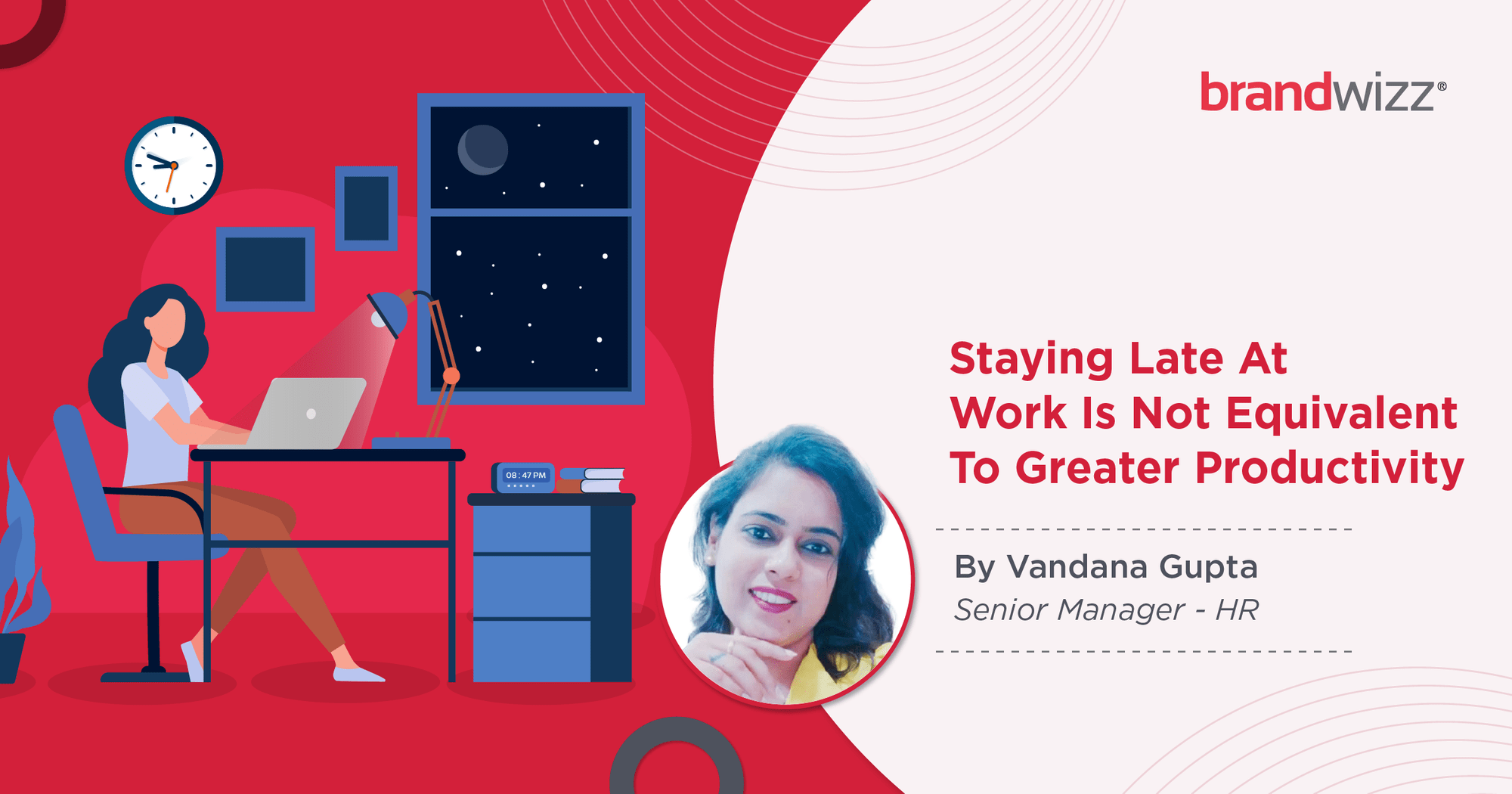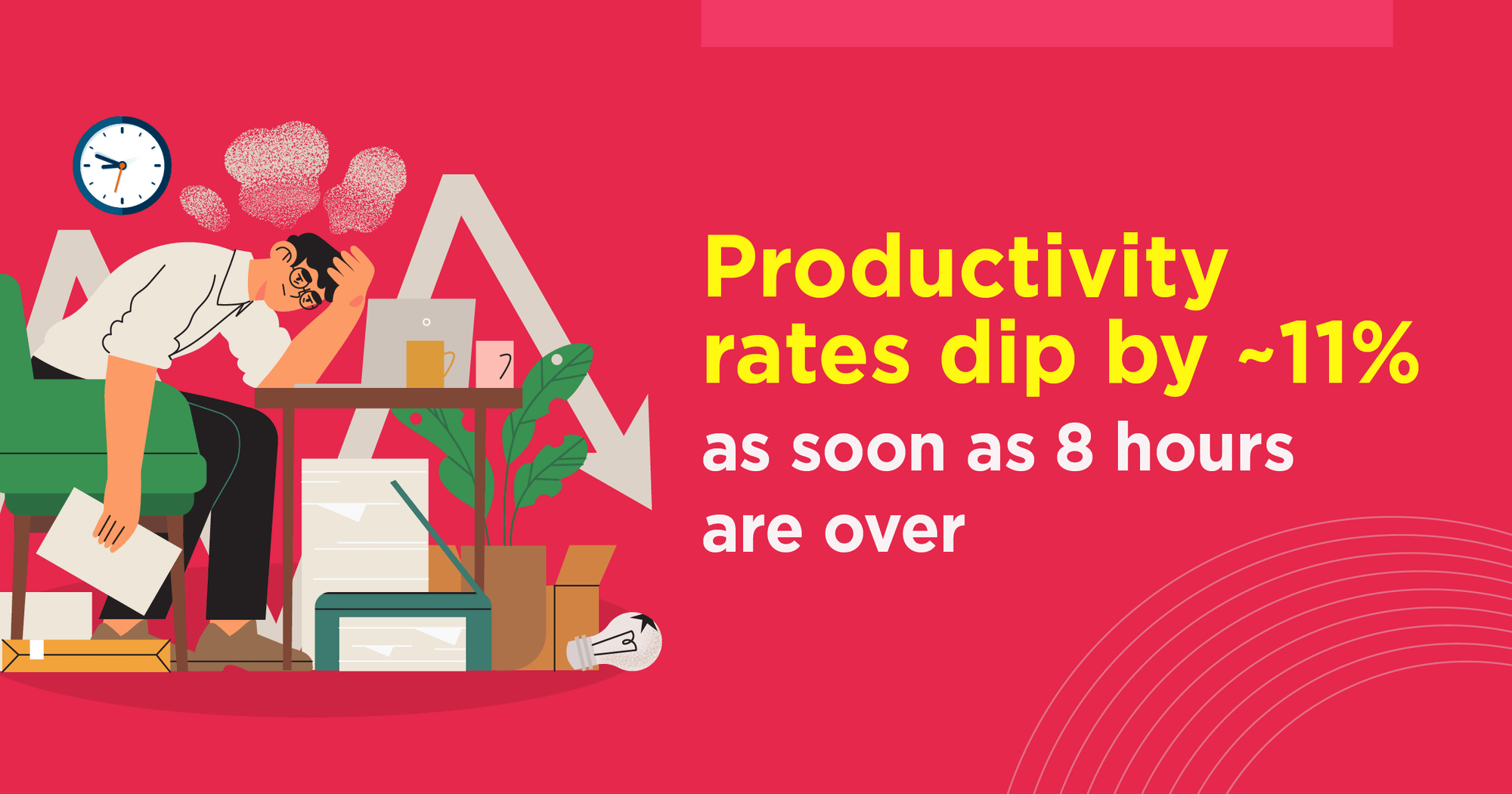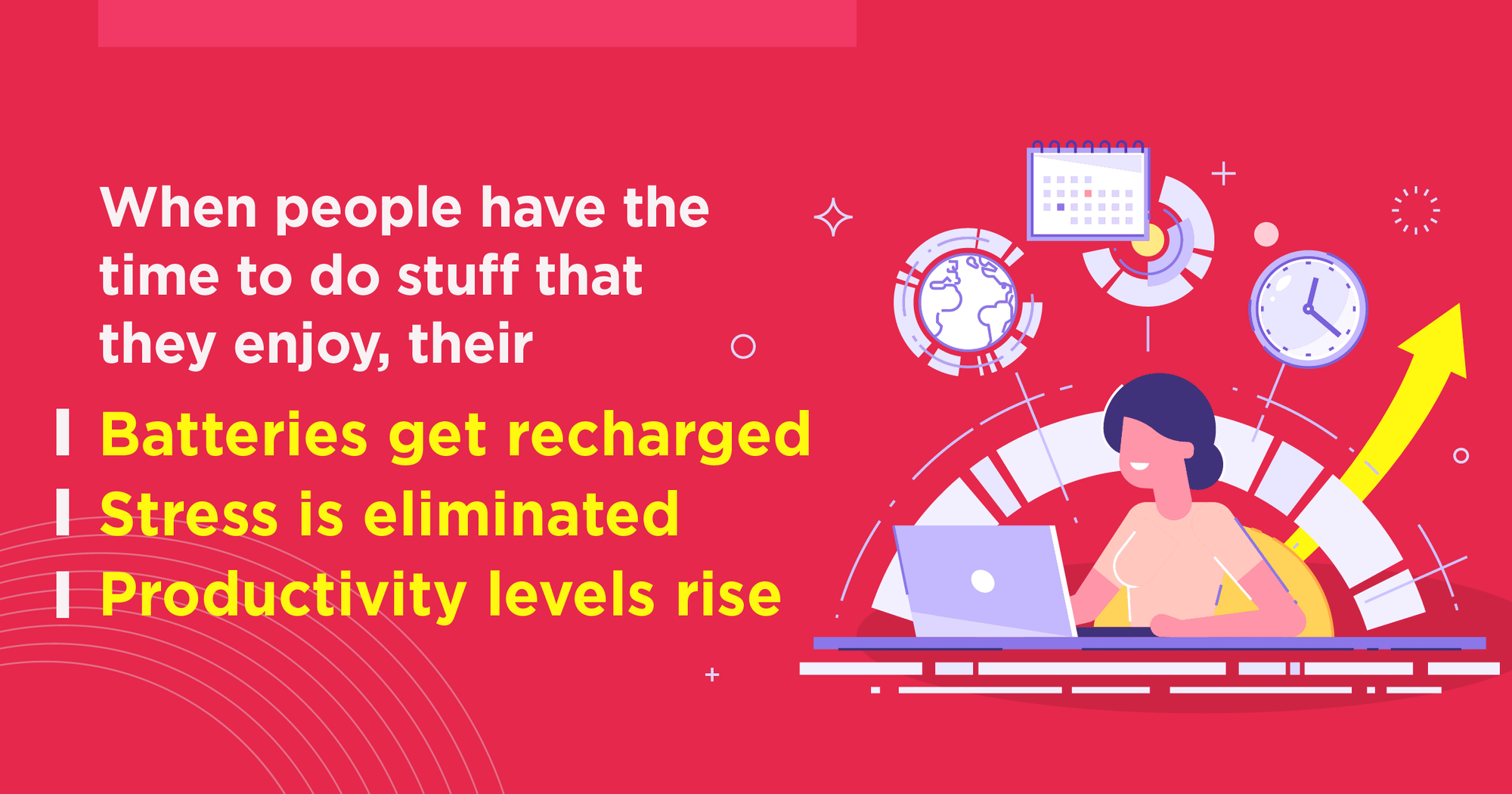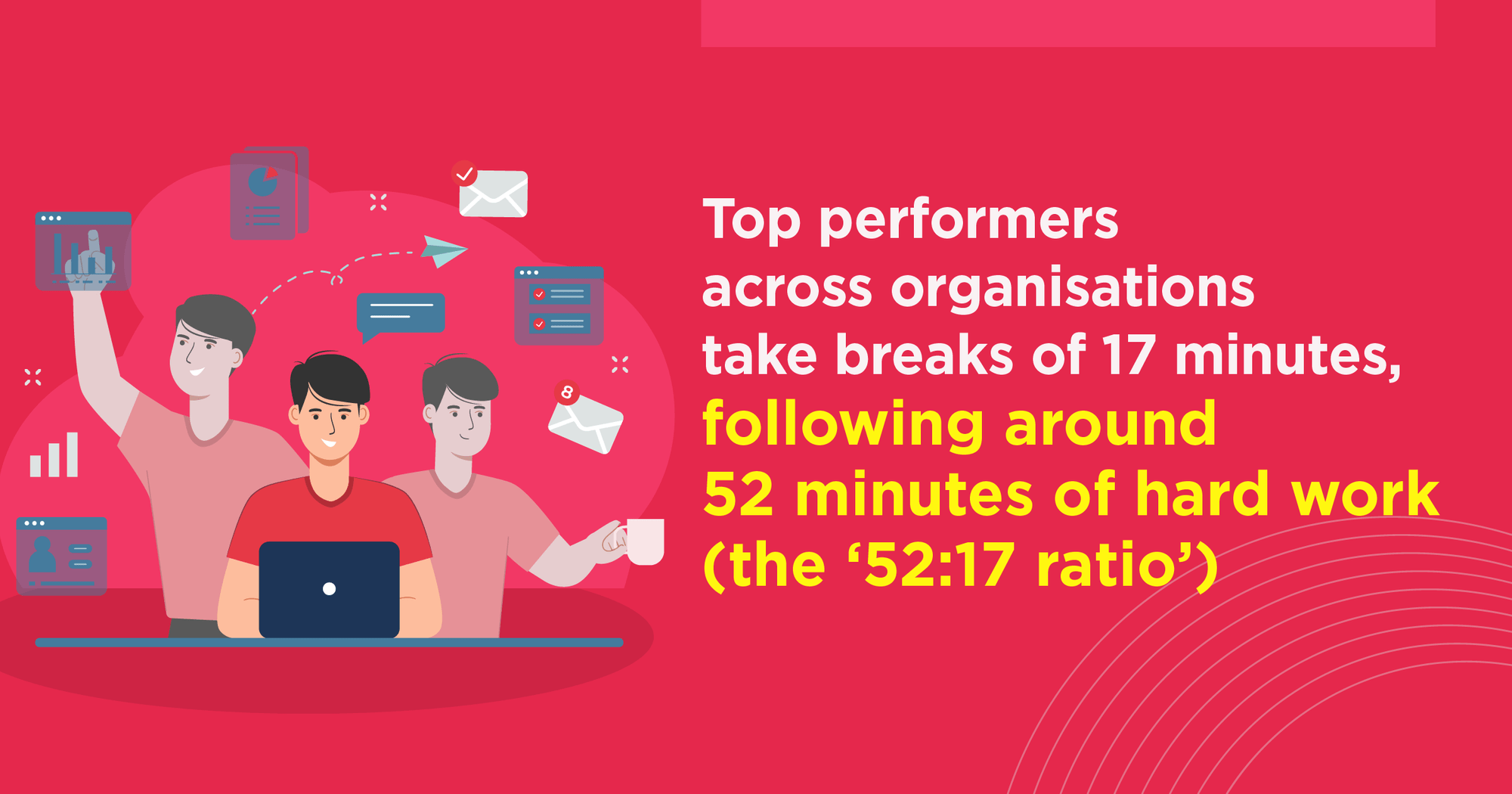Staying Late At Work Is Not Equivalent To Greater Productivity

“Consistently working late is not necessarily a sign of a hard worker, but rather the inability to use time wisely.”
– Victor Bretting
Unfortunately, this fact is lost on many corporate employees across the world. There are 24 hours in a day, and 168 hours in a week – and there is a definite reason why “working hours” or “office hours” have been set to a certain number of hours every day. Of course, there can be the occasional challenging deadlines to be met and projects to be delivered, which necessitates the concerned employees to stay at their workplaces for much longer. However, such situations should come up only occasionally. It is when people start to move towards being ‘work martyrs’ – with the misplaced belief that doing so boosts productivity, or would simply ‘look good’ to colleagues and bosses – problems start to crop up.
Not everyone who consistently works for longer hours than necessary do so in order to impress seniors, however. A recent report found that nearly 53% of workers stay late at the office from time to time, so that they can flex work hours later. People occasionally also stay on because they love their work, or their workspace allows them to focus better. However, nearly 1 out of every 4 employees feel that ‘staying late’ is something that is expected at their hierarchical levels, while many think that slogging for long hours boosts productivity and/or would help them earn brownie points from their reporting authorities. Over here, we will explain that working late regularly is not equivalent to productivity – and often does more harm than good:
The Overworking and Stress Factor
When managers find employees log extra hours on a regular basis, questions often arise over the efficiency of the latter. However, the bigger problem related to such ‘daily overwork’ is the associated stress and burnout risks. From inadequate sleep, lack of orientation, and poor concentration levels, to cardiac problems, diabetes & more – the health risks of elevated work stress can be many, varied and serious. These problems, in turn, often increase absenteeism and can even lead to higher turnover rates. Working ‘too hard’ is not good news – either for an individual employee or for his/her organization.
Note: Sleep deprivation can be a very serious knock-on effect of regularly overstaying at the office. For more than 96% of people, performance levels gradually drop when they sleep for only 5-6 hours everyday.
There Are Fixed Working Hours For A Reason
At most organizations, the average working day comprises a certain number of fixed working hours. In a bid to ‘be more productive’, an employee can lose sight of the fact that this calculation has been done for a reason. A recent study has conclusively shown that productivity rates dip by ~11% as soon as the 8 hours are over. In fact, regular overtime is hardly of any use – with meaningful performance levels dropping by nearly 20% for every additional hour (beyond the scheduled 8). Working till late is, at times, necessary and can help in getting more done, but it should never become the norm at the office.

Eight Working Hours is Defined for a Reason
Note: The human brain is not a machine. Working for long shifts for consecutive days leads to ‘brain fatigue’, necessitating lengthy recovery times.
Need For Timely Task Completion
When someone fails again and again to complete his/her scheduled tasks within the working hours, the problem can be two-fold. The glitch can lie with the employee him/herself – a situation where (s)he takes things a tad too easy in the first half, only to be burdened with excess workload in the later hours. Systematic work planning and execution can reduce such problems, and help people wrap their work in time.
However, sub-optimal work and responsibility distribution can also lead to similar problems. When tasks are not assigned, prioritized, and delegated properly – employees (at least some of them) are likely to find themselves staying at work, long after the scheduled time of departure. In such situations, the onus is on the concerned employee(s) to take up the matter with the reporting authorities and/or colleagues. If required, a change of work set-up can do the trick.
When Overstaying At Work Becomes The New Normal, Work-Life Balance Goes For A Toss
Contrary to what many believe, longer working hours are not synonymous with greater dedication. The person who is logging 10 hours everyday at work might find him/herself cribbing about poor work-life balance, without realizing that the problem lies with his/her faulty day planning. It’s time everyone – employees and the management – realized that there is a life outside of work. When people have the time to do stuff that they enjoy (spending quality time with family & friends, catching up on sleeping, eating out, or just plain relaxing), their ‘batteries get recharged’, stress is eliminated, and productivity levels rise. ‘More Work’ and ‘Quality Work’ are not the same.

Work-Life Balance is Required to be Productive at Work Place
Note: Time-management is often a challenge for people who are forced to regularly stay back at work. Efficient time-managers are generally able to leave work on time AFTER completing all their deliverables.
Bad For Productivity; Bad For The Morale
While there is nothing wrong with staying back at the office for some time to complete deliverables occasionally, doing this too frequently can lead to working overtime becoming an unhealthy habit. Not only are those ‘extra hours’ unproductive, they can wreak havoc in the employee morale factor. When a person feels the ‘work’ or ‘office’ has taken over their lives, it is only natural for him/her to feel disengaged with work, be resentful, irritable, and mentally at a low ebb. No responsible boss or leader in the world wants to set an office culture where overworking is a norm, and employee burnout is a very real risk.
Poor Concentration = Lower Productivity
Too much of anything is never a good thing. This applies to office work as well. When employees are forced to stay late at work regularly (whatever the underlying factor(s) might be), lack of concentration and motivation become serious points of concern. On-the-job stress is a problem for around 8 out of every 10 workers – and when people are too stressed out and mentally/physically drained, they simply cannot perform at their productive best. As a Kansas State University survey proves, the best way to reconnect with work optimally is to leave on time, spend those extra couple of hours to refresh their mind and body, and come back the next day in a better shape.
Must Read: How To Keep Millennials At Workplace Motivated?
Employees also may have a tendency to worry too much about the ill-effects of taking breaks during the workday. While prolonged chitchats at the watercooler and indulging in lengthy gossip at the coffee-table should never be encouraged – the importance of giving oneself some time to move away from the workspace should never be glossed over. A DeskTime report has shown that the top performers across organizations take breaks of ~17 minutes, following around 52 minutes of hard work (the ‘52:17 ratio’).

Taking Break During Work Hours Helps to be Concentrated on Work
Note: The Pomodoro Method of following up 25 hours of intensive work with a break of 5 minutes also warrants a mention in this context. The secret to great productivity lies in ‘purposeful working’, and not just ‘working for long’.
That Thing Called Peer Pressure
Imagine this: You have organized your day well, completed your tasks, delivered whatever was required, and are all set to leave office for the day. Just as you move through the aisle towards the exit door, a murmur reaches your ears: “Oooh, look who’s again leaving office early!”
While people can feel embarrassed in such a situation, there is no earthly reason for such ‘unnecessary peer pressure’. Completing all work AND leaving on time is an achievement – something that one should be proud of, and not be ashamed of. It just means that the concerned person is efficient, cares about his/her life outside work, and understands the importance of restoring energy levels (and does not just slog along).
Being Practical Is Necessary, However…
Technology in general, and the World Wide Web in particular, has led to the creation of the ‘always connected’ world that we live in today. The markets are competitive (some industries more than others) – and having a ‘10-to-6 mentality’ often does not cut the ice. In fact, in the IT, digital marketing or advertising sectors, working at odd hours is not something unheard of. There are times when ‘no’ is not an acceptable answer.
Even when the situation is demanding, it is important to maintain a balance – and not just stare at the computer for hours on end. An employee might have to work overnight for a couple of days here and there – but (s)he should get enough time to relax, recuperate and re-energize him/herself. Smart work trumps hard work, every single time.
A Stanford University report conclusively proves that making a habit of staying late at work is not a good one, and can even prove counterproductive. According to the report, productivity levels start dropping off a cliff when the weekly working hours of employees regularly go beyond 50. In fact, beyond 55 hours, no meaningful, quality work ever gets done (a person can maintain 70-hour workweeks, but those extra hours would be useless). It’s high time all of us realized that ‘more hours at work’ does not mean ‘more work being done’.
With that thought, let’s wrap up for now. I could have gone on and on – but then, staying on for that extra time and writing those extra lines will not add any extra value!

Vandana is a Human Resources Manager at Brandwizz. She Heads Talent Management at Brandwizz. Apart from work, she loves reading and listening to music.




